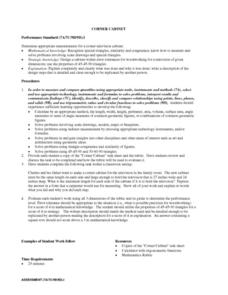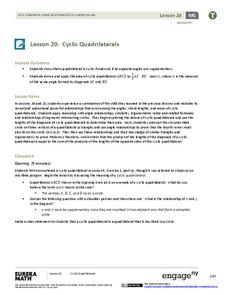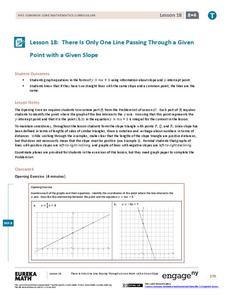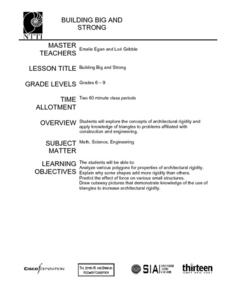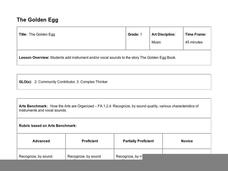Curated OER
CORNER CABINET
Ninth and tenth graders calculate the length, width, height, perimeter, area, volume, surface area, angle measures or sums of angle measures of common geometric figures. They solve problems involving scale drawings, models, maps or...
EngageNY
Criterion for Perpendicularity
The Pythagorean Theorem is a geometry pupil's best friend! Learners explain the equation a1b1 + a2b2 = 0 for perpendicular segments using the Pythagorean Theorem. They are able to identify perpendicular segments using their...
EngageNY
Scale Factors
Is it bigger, or is it smaller—or maybe it's the same size? Individuals learn to describe enlargements and reductions and quantify the result. Lesson five in the series connects the creation of a dilated image to the result. Pupils...
EngageNY
Cyclic Quadrilaterals
What does it mean for a quadrilateral to be cyclic? Mathematicians first learn what it means for a quadrilateral to be cyclic. They then investigate angle measures and area in such a quadrilateral.
Polar Trec
Playground Profiling—Topographic Profile Mapping
The Kuril islands stretch from Japan to Russia, and the ongoing dispute about their jurisdiction prevents many scientific research studies. Scholars learn to create a topographic profile of a specific area around their schools. Then they...
EngageNY
There is Only One Line Passing Through a Given Point with a Given Slope
Prove that an equation in slope-intercept form names only one line. At the beginning, the teacher leads the class through a proof that there is only one line passing through a given point with a given slope using contradiction. The 19th...
Cornell University
Bridge Building
Bridge the gaps in your knowledge of bridges. Individuals learn about bridge types by building models. The activity introduces beam bridges, arch bridges, truss bridges, and suspension bridges.
Curated OER
Building Big and Strong
Middle and high schoolers explore the concepts of architectural rigidity. They analyze a variety of polygons, and explain why some shapes add more strength to structures than others. The PBS video, "Building Big," is utilized in this plan.
Curated OER
Can You Name That Shape?
Learners use materials to build, investigate, and draw two-dimensional shapes (polygons). They combine the shapes they have built and draw from the pile to begin a round-robin activity to name and determine the attributes of a selection...
Curated OER
Polygons
This resource provides 5 different worksheets on the topic of polygons and symmetry. These worksheets cover rotational symmetry, lines of symmetry, symmetry of regular polygons, special quadiralaterals, and polygon transformation. The...
Curated OER
Vectors
Represent motion with arrows and call them vectors! The lesson is a presentation that models the mathematics involved when determining a resultant vector. It addrssses motions that are parallel, perpendicular, and a combination of...
Code.org
Number Systems
Generating a system of shapes. Groups work together to create a number system using three different shapes as symbols. The groups should come up with the rules that generate all the possible permutations of the three shapes.
EngageNY
Definition of Congruence and Some Basic Properties
Build a definition of congruence from an understanding of rigid transformations. The lesson plan asks pupils to explain congruence through a series of transformations. Properties of congruence emerge as they make comparisons to these...
Teach Engineering
Catching the Perfect SAR Waves!
Zero in on an interesting resource involving radar technology. Groups construct a radar sensing unit and learn to calibrate the system. Using the radar system and the Pythagorean Theorem, they calculate distances between objects.
National Council of Teachers of Mathematics
Scale Factor
Does doubling mean everything doubles? Learners adjust the scale factor between two rectangles. Using the calculated measurements, pupils investigate the ratios between the lengths, perimeters, and areas of the rectangles.
Curated OER
Geometric Abstraction
Students create an abstract work of art that is made by repeating geometric shapes and lines, write concise instructions to reproduce the work of art and reproduce someone else's artwork via written instructions.
Alabama Learning Exchange
Twisted Tangrams
Primary geometers create a picture using tangrams. In this geometry lesson, learners read Grandfather Tang: A Tale Told with Tangrams, cut out their own tangrams, and choose a character from the story to make using their tangram pieces.
Curated OER
Ocean Exploration: Shapes and Patterns Under the Sea
So many shapes in our vast oceans. Young explorers can discover new shapes in a variety of ways in this lesson. One way is having free exploration with a pattern shape kit handed out by the teacher. Another is by viewing a...
Hawaiʻi State Department of Education
The Golden Egg
Get ready for a musical story time! First your young musicians review musical dynamics as they listen to and discuss the pitch and sound of each instrument you play for them. Then they talk about special words (mostly verbs) in the book,...
EngageNY
Complex Numbers and Transformations
Your learners combine their knowledge of real and imaginary numbers and matrices in an activity containing thirty lessons, two assessments (mid-module and end module), and their corresponding rubrics. Centered on complex numbers and...
Mathematics Vision Project
Circles and Other Conics
Through a variety of hands-on activities and physical scenarios, this far-reaching unit leads learners through an exceptionally thorough exploration of circles and parabolas as conic sections. Geometric construction techniques are used...
Illustrative Mathematics
Doctor's Appointment
Geometric volume calculations are brought into the real world in a quick set of application problems. Learners are asked to help a patient figure out how to drink a prescribed amount of water both at work and at home. This activity...
Calvin Crest Outdoor School
Survival
Equip young campers with important survival knowledge with a set of engaging lessons. Teammates work together to complete three outdoor activities, which include building a shelter, starting a campfire, and finding directions in the...
Charleston School District
Parallel Lines Cut by a Transversal
Pupils study angle measurements between different types of angles associated with parallel lines and transversals. The independent practice asks pupils to identify the types of angles in a diagram and to determine the measure of...
Other popular searches
- Similar Triangles
- Pairs of Similar Triangles
- Geometry Similar Triangles
- Similar Triangles Ratios
- Similar Right Triangles
- Proving Similar Triangles
- Similar Triangles Worksheet
- Similar Triangles Height
- Similar Triangles Proportions
- Similar Triangles Sas
- Similar Triangles Types
- Similar Triangles Ramps


